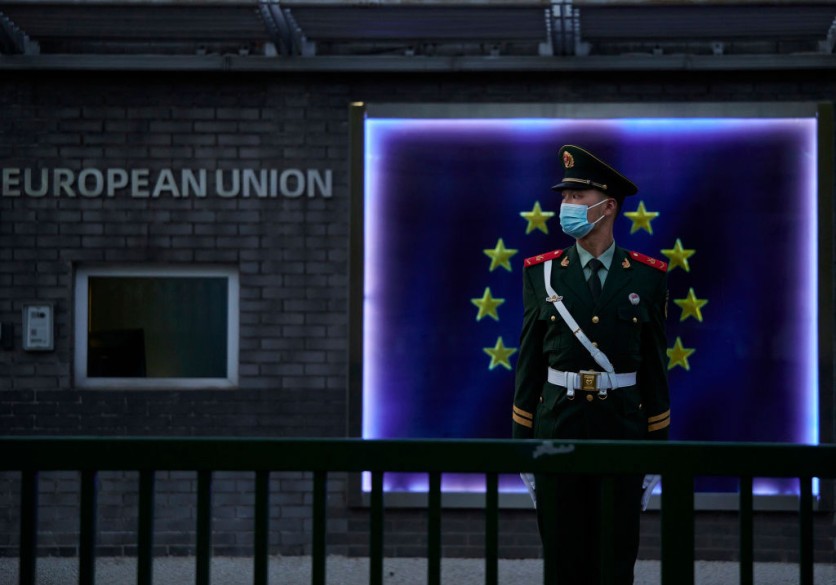Chinese authorities warned Friday that rising EU-China electric vehicles (EV) import tensions might start a trade war. The planned tariffs were Germany's Economy Minister Robert Habeck's main topic when he arrived in Beijing.
Habeck's three-day China visit is the first by a top European official since Brussels suggested heavy levies on Chinese-made EV imports to counter subsidies, according to a Reuters report. China has responded with countermeasures and severe leadership disapproval.
In an unexpected move, German coalition cabinet member Robert Habeck, an environmentalist from the Greens Party, slammed Berlin's 11-month-old China strategy document as obsolete and out of sync with EU policy on China.
EU-China Trade War Looming?
Chinese manufacturers asked Beijing to raise tariffs on European gasoline-powered automobiles this week. In response to the EU's planned EV tariffs, China launched a pork dumping inquiry.
The report stated that a Chinese commerce ministry spokesperson accused Europe of escalating "trade frictions" that could lead to a "trade war." The statement also accused the EU of bullying Chinese companies with tariffs.
Chinese countermeasures pose a threat to German carmakers, as about a third of their sales come from China, a $18.6 trillion market last year. The European Union's EV tariffs have strained commerce with China.
Chinese state media reportedly portrayed Habeck's visit as an opportunity to reduce tensions, with some experts urging Germany to seek consensus. After arriving in Beijing, Habeck met with EU diplomats. He will meet Premier Li Qiang and other authorities in Shanghai and Hangzhou.
During a German embassy reception, Habeck criticized Berlin's China strategy, revealed last July after months of coalition discussions. He suggested updating the policy to reflect European unity.
Habeck cautioned that his visit is unlikely to resolve trade tensions. Notably, Germany wants to increase market access for its firms in China and reduce economic dependence on one country.
Trade analysts say economic and political considerations benefit the US-German alliance. On Friday, official figures showed that Germany's first-quarter 2024 commerce with China, which reached 60 billion euros, was less than its 63 billion euros with the US, changing its top trading partner. In May, German exports to China plunged 14% while US exports climbed 4.1 percent.
Read Also : Change Healthcare Begins Notifying Hospitals, Customers Who Had Data Exposed in Massive Cyberattack

China Dominates Southeast Asia EV Market
Meanwhile, China's prominence in the global EV market continues. According to a recent study, Chinese carmakers dominate Southeast Asia's fast-growing EV industry, lowering Japanese and Korean manufacturers' market share, as reported by Asia Financial.
Hong Kong-based Counterpoint Research revealed Friday that Chinese brands sold 70% of Southeast Asian EVs last year, led by BYD.
The EV surge in Southeast Asia, the "world's hottest market" for battery-powered vehicles, helped Chinese carmakers succeed.
According to a recent study, Southeast Asian electric car sales more than quadrupled in the January-March quarter compared to the previous year. Meanwhile, gas-powered ICE automobile sales declined by 7 percent.
The report indicated that more than 70% of EV sales in the region are from Chinese brands. Chinese automakers sold 75% of Southeast Asian EVs in the first quarter of last year.
China's EV dominance was a result of its focused effort. The Center for Strategic and International Studies (CSIS) reported that China invested $230.8 billion in its EV sector over a decade, as reported by CNBC.
Scott Kennedy, CSIS trustee chair in Chinese Business and Economics, stated that 18.8% of electric car sales between 2009 and 2023 were government-supported. Kennedy highlighted that such expenditure on EV sales fell from about 40% before 2017 to just over 11% in 2023.
Kennedy said Beijing's non-monetary assistance for electric automobiles favored home automakers over international ones.
Related Article : Japan Aims to Become Most AI-Friendly Nation, Countering EU Regulations

ⓒ 2025 TECHTIMES.com All rights reserved. Do not reproduce without permission.




